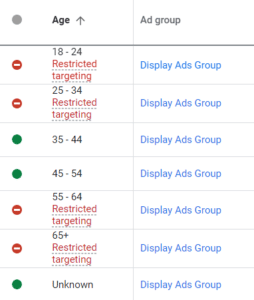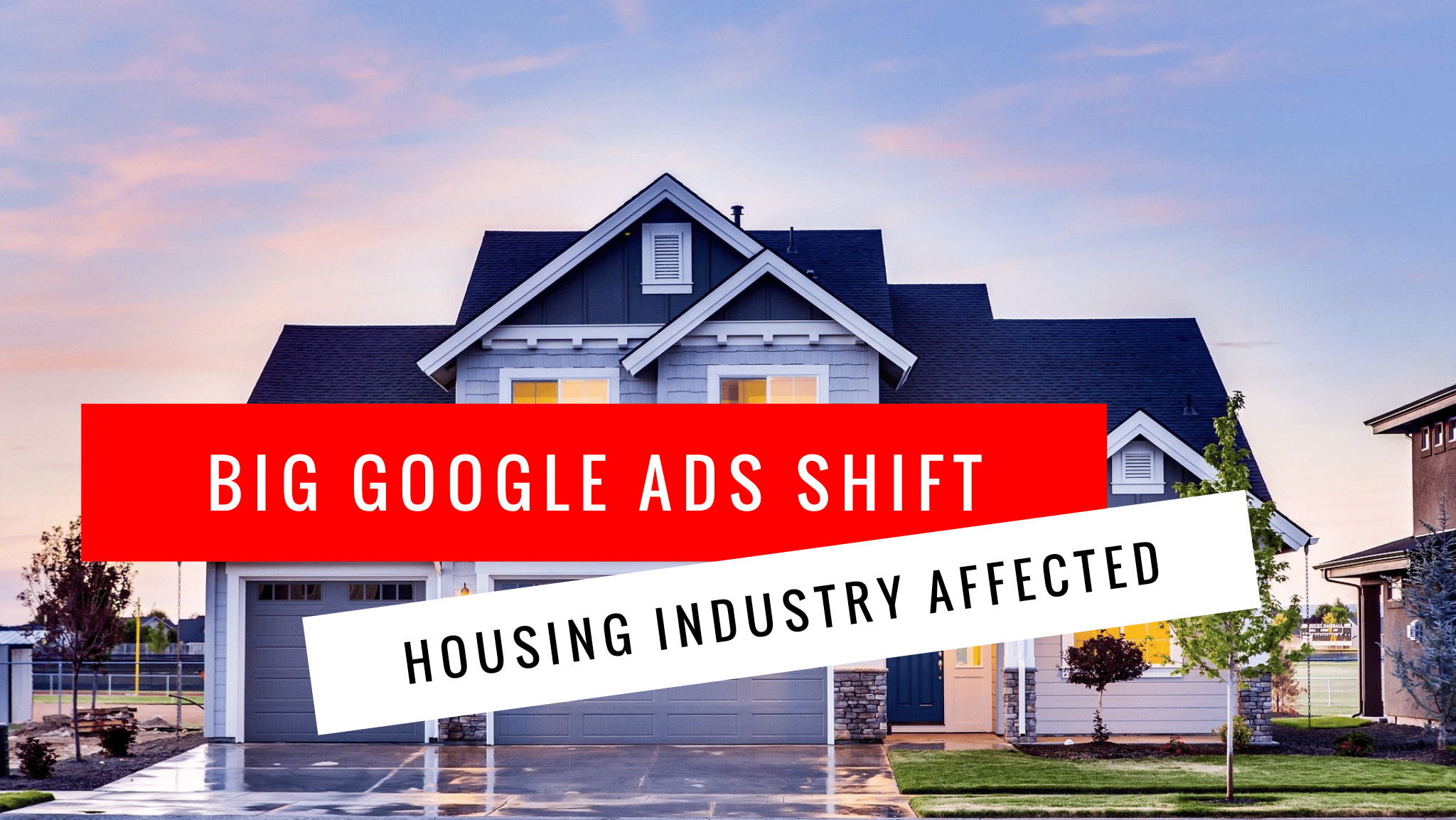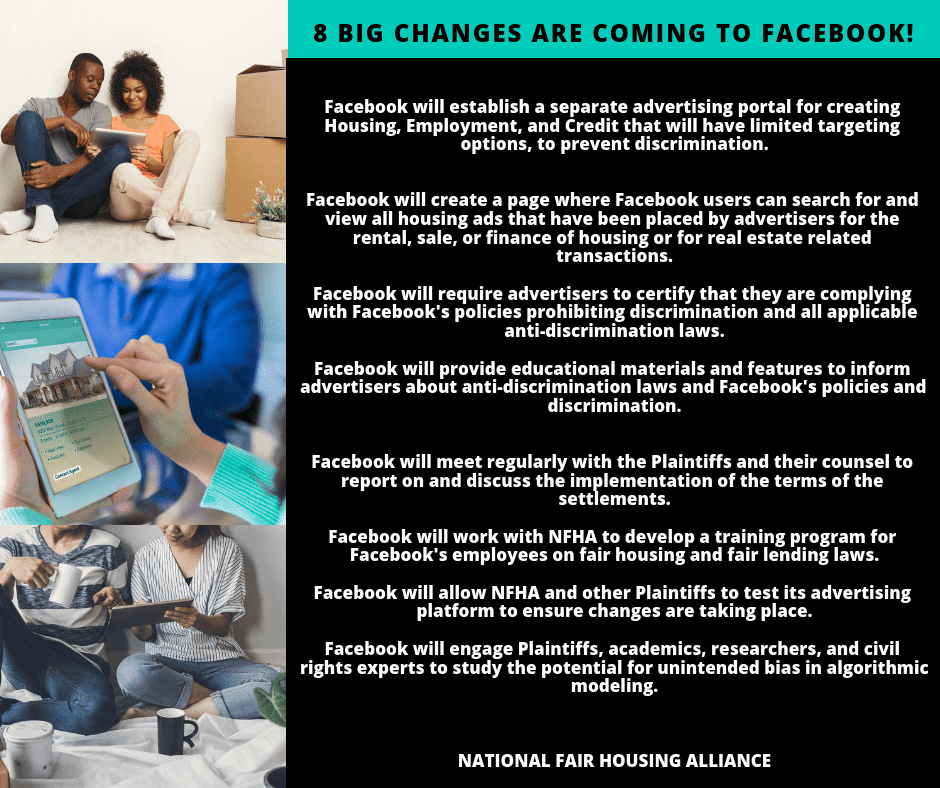Major Ads shift happening in housing industry
In March of 2020 Facebook was sued by the US government by NFSA and reached a settlement of $1.9 million. This is small-change for Facebook but the settlement had far-reaching impacts on the future of online advertising in some key business sectors. More aggressive than the paltry sum paid were the targeting restrictions put on all future businesses in housing, credit lending, and employment.
Discrimination is now assumed
Discrimination is wrong, plain and simple. This lawsuit covers the plaintiffs in some clear violations and discriminations within the housing industry but these wide-sweeping changes now make the assumption that discrimination is the default and not an outlier or fringe case. When people target based purely on race that is a major problem. Facebook made it possible for people to specify, in ad targeting, if the person was white or black based on the likes of that user. Then, some advertisers would exclude black people on purpose with the intent of discrimination. This is a clear violation of civil rights and a clear case of discrimination. What Facebook and now Google is doing wrong is going too far in the other direction with over-regulation.
Limited demo targeting
Facebook and Google are now making it harder for small businesses to reach their target market by limiting targeting options in the housing industry, credit lending, and employment sections. Under the new regulations and advertising rules for these two platforms, one can no longer target ages or zip codes. Google Ads already has certain rules and compliance with what you can and cannot advertise on its platform shown here in Google Ads restricts certain products and services. For various sectors like housing, medical, doctors, and the like they are limitations to what can be shown on Google Ads. Sometimes the bots have very specific elements that will be blocked especially when uploading smaller ads with small text that often get auto-flagged.
By making it more difficult for small businesses to find leads, they are making it easier for big business to swoop in and take up more leads. The simple fact is that these changes require more creative solutions but often, bigger budgets to get clients in these sectors. With leads being harder to come but using the traditional targeting methods. During a time when most small businesses are bootstrapped, this does not help them.
No More age targeting
Age targeting is very important to many businesses that require it to find leads. Senior housing communities are majorly affected by these changes. Let’s face it, no 18-year-old wants to see ads for senior communities online and they really shouldn’t have to; it is a waste of money for the advertiser and annoying for that younger age group.
Many senior retirement living facilities that run ads online are no longer able to only target their demo of 65+ or older on Facebook or Google. This causes a big waste of funds as ads will be shown to people who will never buy the product. Google and Facebook might not initially care as their ad revenues will go up as businesses spend more but in the long run, this will hurt more than it helps.
No more Zip Code targeting
Another way to target users is by zip code. No more thanks to the new ad regulations from Facebook and Google. Targeting by zip code allows businesses to realistically target key demographic areas for their products often based simply by areas that are near their service or that typically are their customers. Zipcode targeting is no longer allowed by Facebook or Google when it comes to housing, credit lending, or employment.
Housing, credit cards & lending, employment industries affected
All of these changes are only, at this time, in effect for the three sectors mentioned above. Small businesses can still use all traditional targeting methods for other industries. This is a major change for those sectors and will affect many small businesses. Housing represents a major sector of small businesses including realtors, real estate professionals, developers, senior communities, active adult communities, and more.
Senior communities affected in a major way
Senior communities including active adult communities, a growing 55+ housing sector, are affected in a major way. These communities can no longer advertise by selecting and limiting ages. 18 to 25-year-olds will now be forced to see more annoying ads that they don’t care about and don’t want to see; think about those prescription drug ads you see that you don’t care about. If you represent a senior community you are required by HOPA and state tax laws to have seniors in your units, showing ads to your age demo makes total sense.
Search, Display ads, Youtube ads all affected
These changes affect all types of advertising on Google Ads including search ads, display ads, and Youtube ads. You must first agree to the new housing requirements on Google Ads to continue advertising on the platform. 
Google knows a lot of information about the user but unknown or not-logged in users still account for around 23% of users based on ad sectors we have noted with local businesses we work with. This means that 77% of users can be identified by their age and location or zip code for example.
Microsoft (Bing) Ads allows targeting
One major platform that has, or has not depending on how you look at it, taken a stand is Microsoft. Small businesses in the housing and other sectors are still able to target based on age and zip code on Microsoft Ads at this time. This has caused many businesses who are already struggling at this time to look at platforms that support them such as Microsoft Ads. See how we use Microsoft Ads and can help you.
Why this is a problem for small businesses
There is no question that discrimination is wrong. The issue here is that these changes will affect many small businesses in a major way when it comes to online ads and getting new leads.
What Facebook and Google did wrong
What Facebook should have done was to remove any option to target based on race and put systems in place to limit this behavior in the first place. Targeting by ethnicity and race should never have been allowed. Google went too far as they were never actually sued and this was a preemptive measure most likely to avoid the bad press. Google did say that these changes have been in effect for months now and that the protests of 2020 did not accelerate or influence this decision to limit targeting.
Google went all-in on restrictions within its ad platform. Google had far fewer targeting options, to begin with compared to Facebook or others like Linkedin and now even Microsoft Ads as well. Compared to the number of choices, Google limiting ages and zip codes is a major drawback for them. There are other ways to target people based on audiences but you have to be more creative in your approach. Radius target is also still allowed which requires a little more strategy overall.
The new mandate in ad policy assumes that advertisers discriminate by default and gives no way for certain sectors like senior communites to enable advanced targeting if they qualify. Google said that at this time, there is no way to get around these restrictions as they are policy. In working with local small businesses we have never seen businesses target based on discrimination. That is not to say it doesn’t happen but these seem to be far fewer than a systemic issue as indicated.
Encourage clients to be aware of these changes hitting Oct. 19th
We encourage all our clients to be educated and aware of these major changes happening to Google Ads starting October 19th. Make your sales team aware that leads will be affected and it could take 3 weeks or longer to bring them back up. Either way, a new ad strategy will need to be crafted.
Many of our clients are looking at Microsoft Ads (formerly Bing Ads) and even shifting away from Google Ad dollars to Microsoft Ads. At this time, Microsoft Ads allows targeting based on zip codes and ages as well as industry and business sectors/jobs thanks to its tie-in to Linkedin (owned by Microsoft). LinkedIn is another platform that allows further targeting but is primarily a B2B sales tool.
Prepare your team for reduced leads
Clients need a new strategy moving forward to get leads in housing
If you have questions or comments, please leave them below.
If you are a small business located in Columbus Ohio and need help with online advertising or SEO contact us

